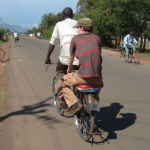This past month I had a fantastic opportunity presented to me in the University of Ottawa’s Kenyan field research course. My experiences in Kenya were, of course, limited to the five weeks I spent there; so I can make no claim to expertise in Kenya beyond my own initial observations. These observations are, however, valuable in themselves, as culture shock often presents some of the more stark differences between two countries.
The Kenyan approach to social interaction is much friendlier than what you would encounter in Canada. When I refer to social interaction, I mean the day to day interactions that one would have with people they otherwise did not know. A Kenyan shopkeeper would happily shake your hand and ask you about your day without any prior knowledge of your existence.
With that being said, Kenya is very heavily rooted in religious ideals when considering topics such as abortion or same sex union (homosexuality and abortion are still illegal in Kenya). This is not to say that Canadians are the perfect picture of morality and human rights. During my stay, I had the opportunity to speak with Kenyans about the activity of Canadian corporations abroad. On the forefront of these discussions were Canadian mining companies, enabled by Canada’s archaic mining laws to conduct practices internationally which leave a dark smear on what many Canadians would consider to be a gleaming image. Conversations such as this should naturally lead to a questioning of Canada’s role on the international stage. Is our reputation a good one, or has it degraded to the point where I should advise residents of the USA AGAINST wearing the Canadian flag on their backpack.
But I digress into a topic which is more deserving of a PhD than a short essay. Most Kenyans do not appear to hold countries such as Canada or the USA as international pariahs, but an ideal to strive toward. The town of Kisumu, on the edge of Lake Victoria frames this observation well. Kisumu is well known to have been the place of US President Barack Obama’s ancestry, and it is difficult to have a conversation about Kisumu without being reminded of that fact. Obama’s face and name are found plastered over walls, vans, streets and t-shirts. His Grandmother, who still resides within the area, has become an important public figure, who holds the respect of many within the community. Whether this adoration is positive or negative is not for me to decide, but it is fairly comical to walk down the street and hear a “Yes we can!” being shouted out of a crowd.
The sentiment embodied in this phrase is a good representation of the youth movement which I was so privileged to witness within the Mathare slums area of Nairobi. These slums are, quite frankly, a horrific thing to witness: garbage and sewage littering the streets; dilapidated structures; disease; and lack of fresh water. It is enough to leave a development student, such as myself, ashamed for discussing such topics flippantly over pizza. As bleak as the situation appears there are those, such as the Mathare Roots Youth Group, who are striving to ensure a better future for their community. The small community youth group helps to provide AIDS awareness campaigns; community clean-ups; promotion of education and empowerment of youth. It is a prime example of the type of grass-roots organization which appears to be capable of making a difference, as opposed to several of the top-down ‘slum upgrade projects’ which have often been met with failure.
These observations are a mere sliver of Kenya’s extremely rich culture, and some of the challenges which they face. Kenya’s ethnic and geographic diversity presents an opportunity for a deep cultural immersion, which would undoubtedly serve each traveller in a different manner. I would recommend it as a destination for all who would seek to better their perspective and their appreciation of cultural diversity.



